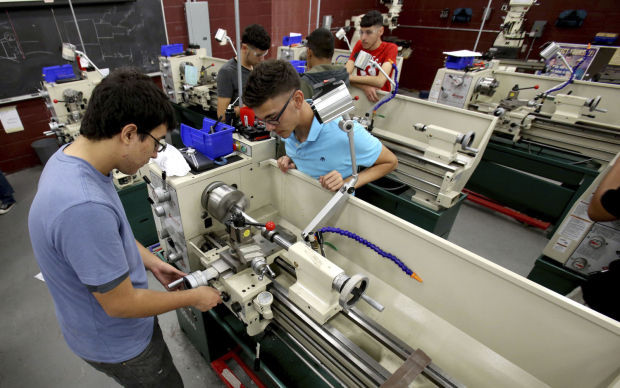PHOENIX — Key legislators have crafted a deal that should save technical education programs in the state and the 100,000 students enrolled there — or at least buy them some breathing room.
Sen. Don Shooter, R-Yuma, said the plan would restore $28 million of the $30 million lawmakers voted last year to cut from Joint Technical Education Districts this coming school year. The plan also would scrap the proposal by Gov. Doug Ducey to give JTEDs just $10 million of that back, but for just three years and with strings attached.
JTED officials from around the state said the Ducey budget, on top of previous budget reductions, would mean the end of the programs.
Gubernatorial spokesman Daniel Scarpinato said his boss had not yet seen the plan and could not comment.
“The governor is open to any good idea that funds career and technical education — and also keeps the budget balanced,” he said.
That could set the stage for a showdown given that the deal not only would cost $18 million more a year than Ducey wants to spend not only this coming fiscal year but for the coming two years — and $28 million annually after that once the governor’s three-year funding expires.
Shooter, however, may have the upper hand.
An earlier plan simply to restore the $30 million had the support of more than 70 of the 90 legislators, far more than necessary to survive a gubernatorial veto.
That list, however, did not include Senate President Andy Biggs, R-Gilbert, a frequent critic of JTED practices, who could use his power to unilaterally sideline the measure.
But Biggs told Capitol Media Services the new plan has some significant changes that he believes will protect taxpayer dollars. And that, he said, means he supports the package.
JTEDs are set up by school districts to provide training in technical fields, often those which can require expensive equipment or supplies that can make them unaffordable to any single school. These range from health-care fields, such as nursing, to training that results in someone being able to graduate with the necessary certificate to immediately start work, such as cosmetology.
The concept allows not only for school districts to combine efforts but also provides additional state funding.
Critics, including Biggs, have argued that what started out as a good idea has become a way for schools to get extra tax dollars for programs that really do not qualify as career and technical education.
Under the deal, districts will be audited to see how they are spending their money. There also will be a new grading system.
Shooter said the change also would eliminate the option for students who already have graduated to come back to take free classes that would lead to a job. He said if they want that extra training, they would have to pay tuition.
Potentially more significant, the legislation redefines — and somewhat narrows — what constitutes a JTED program to ensure they fit within what lawmakers believe is the proper role for the special districts.
For example, it requires a majority of instructional time to be in a lab, in the field or a work-based learning environment. Program also would have to show they need specialized equipment that exceeds the costs of standardized education courses.
And courses would qualify for JTEDs and the extra funding that they get only if they lead to a job in the field without having to go to college or have more than a year in postsecondary education.
“These are not just cosmetic reforms,” Biggs said. “They are true reforms.”
The deal was met with a certain skepticism by Bob Schlanger, a member of Pima County JTED.
“I have no problem with audits,” he said. “We have nothing to hide.”
But Schlanger said he feared that the effort to eliminate certain programs from JTEDs would undermine a key purpose behind why they exist.
For example, he cited a pre-engineering program whose instructors include retired Raytheon engineers.
“Those programs would no longer qualify for funding,” Schlanger said, because students who graduate from that program would not be job-ready, as would a cosmetology student, with just a high school diploma. He said that would be a mistake.
“The whole concept of JTED funding is that we’re getting kids career and higher-education ready,” Schlanger explained.
“We’re running programs that aren’t just a desk and a book,” he said, but require labs and expensive equipment. “You can’t run any of the programs you have on budgets that are for just lights and books.”
Ducey’s plan does more than cut funding by two-thirds.
It also requires businesses that would be looking for graduates to provide matching funds, whether in cash or equipment. And if they wanted to continue the program beyond the three years they would have to pick up the entire cost.
“That’s not public education,” Schlanger said. “That’s gutting public education.”
He also took a swipe at the governor, who has said he wants to run the state more like a business.
“You tell me what business with a major division that’s pretty successful is going to shut it down overnight without any discussion,” Schlanger said.





